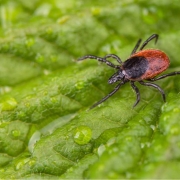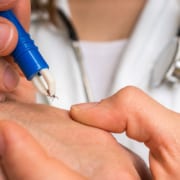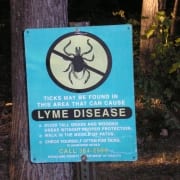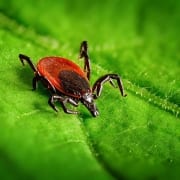Tick Bites: What You Should (And Shouldn’t) Do If You Get One
Lyme disease and other tick-borne illnesses shouldn’t prevent you from enjoying the outdoors, but you should absolutely be aware of how to best protect yourself and what to do if you think you may have been bitten by a tick.
Lyme disease and other tick-borne illnesses (babesoisis, ehrlichiosis, anaplasmosis, bartonella, and Rocky Mountain Spotted Fever) can cause skin, heart, joint and nervous system problems. Early symptoms may be fatigue, chills, fever, headache, muscle and joint aches and swollen lymph nodes. With the chances of getting a tick bite higher than usual this year, precautions should be taken to minimize your risk. This includes using an effective repellent*, wearing long pants and sleeves whenever possible, incorporating a tick-check into your evening routine, and most importantly, staying educated on signs, symptoms, and treatments.
* Choose a repellent that contains one of the following: Picaridin (20%), IR3535 (20%), DEET (20-30%) or Oil of Lemon Eucalyptus (30-40%)
Below you’ll find some myths and truths about tick bites, and what to do if you think you may have Lyme, by Jane Marke, M.D., Integrative and Holistic Psychiatry
Tick Bite Care
What to do if you get a tick bite? There are some myths, but there’s good science busting them.
- Tick attachment time is irrelevant. If a tick is sick enough, Lyme bugs are in their saliva, and they transmit the disease immediately. If the tick is less infected, they have to send bugs from their stomach to mouth, and that takes longer. But do you really want to count on how sick the tick is? Don’t let anybody tell you that because the tick wasn’t attached for 24-36 hours you’re ok.
- One double-dose of doxycycline is not sufficient. The guidelines that are on the government guideline website, www.guidelines.gov advise 21 days. (That’s a federal government Institute of Medicine website and it’s high quality). No other Lyme guidelines exist. (CDC is not in charge of guidelines; the Institute of Medicine is.) The problem with the study of one single-dose of doxy is that it looked for the bull’s eye rash; it did not look to see if people got sick later. It reduced the rash incidence by 87%. That’s something; but not enough, and it tells us nothing about whether those without rash got sick later. There is no reason to not follow the government guidelines and to risk your health or that of your child because somebody only wants to give you one “double dose” of doxy. There are mice studies of this treatment, and they look abysmal
- If you missed the tick bite and have the bull’s eye rash you are lucky inasmuch as you have incontrovertible evidence of being infected with Lyme. You HAVE Lyme. You can still get “early Lyme” treatment, but it’s not the same as treatment for a tick bite. You can find recommendations for treatment on the www.guidelines.gov website. Here’s a direct link to the Lyme Guidelines: http://bit.ly/2tqnaGU. These are government endorsed guidelines, the best we have at this point in time.
- Tick-testing is controversial. Don’t wait for the testing to get treated. Negative tick tests give you no useful information; we have no idea how reliable tick testing is vs human testing. But if a tick is positive for a co-infection, something other than Lyme, you might consider getting prophylactic treatment. That’s your call, made with your doctor, but it’s a real consideration. So if you send the tick for testing, make sure the lab tests for co-infections, as well as several species of Lyme.
Jane Marke, MD
Integrative and Holistic Psychiatry
Urgent Tickbite Care
80 East 11 Street, Suite 214
New York, NY 10003
Additional resources:











Leave a Reply
Want to join the discussion?Feel free to contribute!